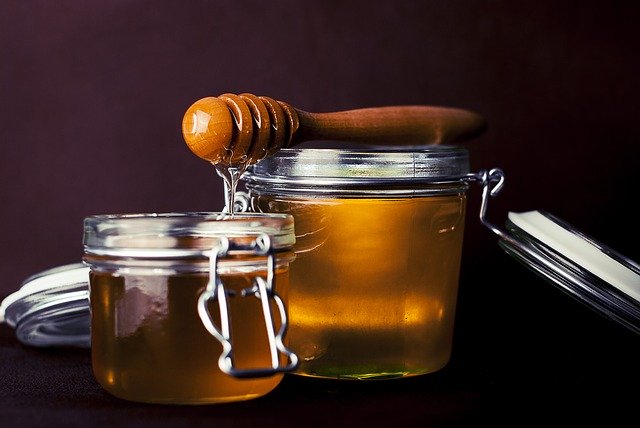Can Dogs Eat Honey? Is Honey Safe For Dogs?
 |
| Can Dogs Eat Honey? Is Honey Safe For Dogs? |
Simple and sweet, honey contains natural sugars that have a wide variety of medicinal properties. It also happens that, occasionally, it enters the jaws of our dogs.
If your dog ended up in the honeypot or if you plan to give honey for medicinal reasons, you will probably want to know if honey is safe for dogs and has health benefits.
Is Honey Safe For Dogs?
Honey is safe for dogs to eat in small amounts. It contains natural sugars and small amounts of vitamins and minerals and is used as a sweetener in many foods and beverages.
This sweetness has a price. The high sugar content of honey can lead to obesity in dogs if the owners feed too much honey and do not provide an adequate, balanced and exercise-adapted diet. Sugars can also cause tooth decay, so it may be wise to brush your dog's teeth if you feed him with honey.
Raw honey should not be given to puppies or dogs whose immune system is compromised, as it may contain the presence of botulism spores. Honey shouldn't be given to diabetic or obese dogs.
Benefits Of Feeding Honey Dogs
A simple search on Google reveals thousands of sites offering honey as a health supplement for humans and pets, including dogs. Honey is said to have antimicrobial and antifungal properties, reduce inflammation, soothe stomach ulcers and sore throats and heal allergies.
However, few conclusive scientific studies have validated these claims. Many of these claims are anecdotal, but because honey is relatively safe, they are often sufficient for homeowners looking for additional, affordable, and safe treatment for their dogs.
One of the most common claims about honey is that it can cure seasonal allergies in humans and dogs. Although scientific evidence is lacking, there is reason to believe that raw honey may help reduce allergic reactions to flower pollen - assuming, of course, that your dog is allergic to any of the pollens in the plant. honey and not to another environmental allergen.
Regardless of the lack of conclusive research, feeding your dog with a small amount of honey to help him with allergens will not hurt him, even if it is not guaranteed or even likely to help him.
Humans also use honey to relieve the raw throat and stomach. If your dog has a sore throat and you have already consulted with your veterinarian to determine the cause and follow the instructions for his treatment, it may be helpful to give him some honey to relieve any lingering inflammation. At the very least, this will give your dog a delightful distraction.
watch this video to learn more :
Can Dogs Eat Honey? Is Honey Safe For Dogs?
How Much Honey Can You Feed Your Dog?
 |
| Can Dogs Eat Honey? Is Honey Safe For Dogs? |
If you want to feed your dog with honey, ask your veterinarian how much is acceptable to feed your dog. In general, less is more when it comes to dog treats, especially for smaller breeds. If your dog has a health problem such as diabetes, ask your veterinarian if honey is safe for feeding and consider giving him a treat that contains less sugar, such as cucumber.
Are There Any Negative Side Effects To The Use of Honey In Dogs?
Unfortunately, some pets may not be able to enjoy the health benefits of honey. If your dog belongs to one of these categories, he should not receive honey:
1. Diabetic Dogs - Honey has a high glycemic index and can increase blood sugar levels. Its use should, therefore, be avoided in diabetic animals.
2. Puppies - The use of honey should be avoided in dogs under one year old. Because of their immature gastrointestinal system, puppies are more likely to become ill because of bacterial spores that can contaminate honey. Wait for your dog to become an adult before adding honey to his diet. Even so, if your adult dog has a compromised immune system, avoid feeding him honey.
3. Allergy to bees - Animals may develop an allergy to bee stings. Hypersensitive animals can react simply by ingesting honey.
4. Obese Dogs - Honey should not be administered to obese dogs, given their high caloric value. Watch for your dog's weight gain and stop giving him honey if he is gaining weight.
What Kinds Of Honey Can Dogs Have?
 |
| Can Dogs Eat Honey? Is Honey Safe For Dogs? |
Use raw honey for medicinal purposes. Unlike honey found in packages or in these ubiquitous honeybee bottles, raw honey is neither processed nor pasteurized. This means that it is neither filtered nor heated, a process that kills bacteria, but also reduces the presence of certain medicinal properties, such as local pollen (to know more about why this matters later! ).
How Should You Use Honey For Dogs?
Honey can be a treat for your dogs - many homemade dog cookie recipes call for honey. It can also be used directly on the skin or administered orally to your dog in small amounts.
How Much Honey Should You Give Your Dog If He Eats It?
Honey is high in calories and should be administered to your dog only in very limited amounts. As a teaspoon contains about 17 grams of sugar and 70 calories, Honey Bee Conservancy does not recommend more than one teaspoon of honey a day. Too much honey could cause tooth decay, and be sure to consult your vet for the correct amount, especially if your dog is overweight or is diabetic.
Dog Honey As Home Treatment For Kennel Cough
Some dog owners use honey as a cough kennel treatment at home, especially to reduce coughs, relieve sore throats and help heal infected dogs. Dr. Ford, a professor of medicine at the College of Veterinary Medicine at the University of North Carolina, who recently answered all our questions about kennel cough, was less convinced of the healing properties of honey against kennel cough. "Honey" to treat kennel cough is a conjecture. I guess we could also try chicken soup from a New York caterer - which is supposed to work in humans suffering from "kennel cough" [also], "says Dr. Ford.
Can Honey For Dogs Cure Your Dog's Allergies?
If your dog suffers from environmental allergies, the Honey Bee Conservancy says that feeding honey could improve its symptoms, just as honey is used to naturally treat human allergies.
You must feed your dog with raw honey, which will contain small amounts of pollen from your area. The idea is that if you regularly feed your dog with this raw and local honey, your dog's system may develop immunity against local pollen triggers over time. Eventually, he might show no symptoms of allergy. Honey collected in hives outside your area will not help local allergies because the pollen will be different from the local pollen your dog has an allergic reaction to. The local farmers market is a great place to find some very local honey, and you may be able to speak directly to the beekeeper.
Will honey help arthritis or mobility problems in your dog?
Dog parents say yes. Healthy With Honey thanks researchers at the University of Copenhagen for conducting a successful study showing that daily doses of honey and cinnamon for a week allowed previously affected patients to move without arthritis pain.
Dog Honey As a Skin Treatment
Honey can be used topically to help reduce swelling and redness associated with skin wounds, or even increase healing time and reduce infection. The New York Times reports that small burns (on people) treated with small amounts of honey healed faster than similar burns coated with antibiotic ointment.
5 Reasons to Feed Your Dog With Raw Honey
 |
| Can Dogs Eat Honey? Is Honey Safe For Dogs? |
Raw honey is one of the most powerful and versatile remedies in nature, even for dogs! Use raw honey on your dog for the various ailments listed.
1. Local raw honey relieves skin allergies in dogs
Note that we said, local honey. A local product contains very small amounts of pollen in your area. So when your dog ingests honey, his body can gradually adapt to potential allergens, which should help prevent a real attack. Tip: Make sure you have an environmental allergic reaction.
2. Raw honey helps dogs with kennel cough
Honey is a recognized solution for relieving throat irritation and coughing. For kennel cough, you can use local honey, but Manuka honey for dogs with kennel cough may be your best choice. Made by bees pollinating Manuka trees in New Zealand and parts of Australia, Manuka honey has the highest antibacterial properties of any honey in the world. It is also the most expensive honey in the world and can cost three to four times more than local honey.
3. Raw honey cures minor topical wounds
Manuka honey is also an excellent choice for a natural bandage. In fact, Manuka honey is approved by the FDA for use in burnt human patients. But any raw honey will help keep the wound clean and moist, which promotes healing. The natural antibacterial properties of honey reduce the risk of infection and protect the injured area.
After cleaning the wound, spread it over a thick layer of honey and apply a light bandage if necessary. Of course, you may also need to use an Elizabethan collar or similar device to prevent your dog from licking the area!
4. Raw honey reduces gastrointestinal disorders in dogs
In case of a minor episode of stomach upset or diarrhea that may result from something simple, such as your dog feasting on fresh grass, a few doses of honey can help calm and soothe his digestive tract.
Some veterinarians suggest that honey helps control minor stomach ulcers, as its natural antibacterial properties can help destroy bacteria that can cause ulcers.
Once again, you must know for sure what you are dealing with. It is therefore wise to seek advice from a veterinarian in such situations.
5. Honey can give more energy to dogs
Honey is sugar and sugar stimulates energy. Anecdotal evidence shows that honey helps many older dogs recover some of their old sperm and motivation. Many canine athlete owners use honey to promote their energy, stamina, and vitality.

Comments
Post a Comment